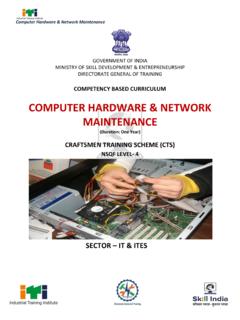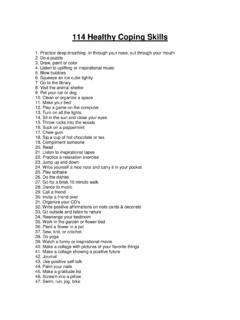Transcription of EMPLOYABILITY SKILLS
1 1 Competency Based Curriculum EMPLOYABILITY SKILLS (Blended Learning) For CRAFTSMAN TRAINING SCHEME (CTS) / APPRENTICESHIP TRAINING SCHEME (ATS) Redesigned in 2019 Developed by Government of India Ministry Skill Development and Entrepreneurship Directorate General Training CENTRAL STAFF TRAINING AND RESEARCH INSTITUTE EN-81, Sector - V, Salt Lake Kolkata 700091 2 Members participated for Trade committee meeting to finalize the syllabus of EMPLOYABILITY SKILLS at NIMI, Chennai S No. Name & Designation (Shri/Smt) Organization Remarks 1. Dhingra, Director NIMI, Chennai Chairman 2. Sanjay Kumar, Director DGT, New Delhi Member 3. BVS Sesha Chari, Director CSTARI, Kolkata Member 4. Dr. T. Jayasudha, Deputy Director NIMI, Chennai Secretary 5. Nirmalya Nath, Deputy Director NIMI, Chennai Member/ coordinator 6. Sarita Upadhyay Medha Leaning Foundation Member 7. Shivani Sharma Medha Leaning Foundation Member 8.
2 Padma Jayaraman Mahindra Pride Classroom Member 9. Anandhi Arvind, State Head Mahindra Pride Classroom Member 10. Mohammed Faiyaz Mahindra Pride Classroom Member 11. Deonizia Sampai, Manager, Facilitator Development TATA STRIVE Member 12. Sailas Praveenth, Project Manager, Programme Execution TATA STRIVE Member 13. Charu Babbar, Specialist Content Design & Development TATA STRIVE Member 14. Ajita Karve, LEAD Design & Incubation TATA STRIVE Member 15. Sarmila Mohapatra, YDM Facilitator TATA STRIVE Member 16. Muthurama Subramanian, Manager Service Training Ashok Leyland Limited, Guindy Member 17. Ashish Katiyar KPMG PMC Team STRIVE PROJECT Member 18. Dhanya Narayanan, COO Rubicon Skill Development Member 19. Pravir Kumar, CEO Rubicon Skill Development Member 20. Shalini Mehra, Associate Director Quest Alliance Member 3 21. Sushmitha Sridhara, Manager Training & Content Quest Alliance, Bangaluru Member 22. Ashutosh Tosaria Quest Alliance Member 23.
3 Kotresh H. B Quest Alliance Member 24. Dr. Sumathi Shivakumar, Asst. Professor of English A. M. Jain Collage, Chennai Member 25. Ashoke Rarhi, Dy. Director CSTARI Kolkata Member 26. K. Karpagam, Deputy Director DET, Chennai Member 27. Mayank N Parikh, Principal ITI Saraspur, Ahmedabad, Gujarat Member 28. K. V. Satya Narayana, Trg. Officer CSTARI,Kolkata Member 29. C. Gopinath, Trg. Officer NSTI Chennai Member 30. A. Vairamani Govt. ITI, Aruppukottai, Tamil Nadu Member 31. J. Kingsly Peter GOVT ITI Coonoor, Tamil Nadu Member 32. K. Mani Kandan, Trainer GOVT ITI Cuddalore, Tamil Nadu Member 33. P. Selvam, Trainer GOVT ITI Ariyalur, Tamil Nadu Member 34. J. Sajin, Trainer GOVT ITI Konam, Nagercoil, Tamil Nadu Member 35. B. R. Srikanth, Trainer GOVT ITI, Trichy, Tamil Nadu Member 36. Dr. Poonam Sinha, Director NEISBUD Expert 37. Ashwinder Singh Bahal, Director (Voc) NIOS, New Delhi Expert 38. Rajeev Khurana, Senior Advisor Training Academy Division, Maruti Suzuki India Limited, Gurgaon Expert 39.
4 Leena Deshpande, Associate Vice President (HR) and Head CSR Bharat Forge Ltd., Pune Expert 40. G. Murali, Principal Ramkrishna Mission Vidyalaya, Coimbatore Expert 41. Jeetamitra Satpathy, Principal ITI, Bhubaneswar Expert 4 CONTENTS S No. Topics Page No. 1. Rationale 6 2. General Information 7 3. Allotment of time and marks between topics 8 4. Distribution of Topics between semesters 9 5. Learning Outcome 10 6. Details of Syllabus 11 7. Assessment Criteria 17 8. List of Tools & Equipment 19 5 1. RATIONALE EMPLOYABILITY SKILLS play an important role in one s career. Professional SKILLS are a person s skill set and ability to perform a certain type of activity or task. EMPLOYABILITY SKILLS are a person s ability to interact effectively with co-workers and customers. Hard SKILLS are mainly applicable at the work place. EMPLOYABILITY SKILLS are applicable both at workplace and outside the work place.
5 EMPLOYABILITY SKILLS complement the hard SKILLS which are occupational requirement of a job. It also complements many other activities even outside the work place. Presently EMPLOYABILITY SKILLS are increasingly sought out by employers in addition to standard qualification. There are instances of professions where EMPLOYABILITY SKILLS proved to be more important, on a long term basis than occupational SKILLS . EMPLOYABILITY SKILLS refer to behavior, communication, IT Skill, work ethics etc. which makes a person suitable to effectively work in a team. Studies suggest that EMPLOYABILITY SKILLS are equally important indication of job performance as hard SKILLS . The competency level of the worker increases with the EMPLOYABILITY SKILLS and takes him to the next level. Recognizing this importance of soft SKILLS the National Council for Vocational Training (NCVT) during its 38th Meeting held on 31st May, 2011 recommended introduction of subject EMPLOYABILITY SKILLS replacing Social Studies in ITI curricula.
6 Government of India accepted the above recommendation of the council (NCVT) and introduced the subject EMPLOYABILITY SKILLS in ITI curricula in place of Social Studies from the August, 2012 session. In the STRIVE meeting held on 26th march 2019 through video conferencing for Improved Teaching with blended mode of Learning with CSTARI and NIMI along with DDG (C&P), chaired by DG/AS, It was directed to revamp the present EMPLOYABILITY SKILLS of 110 Hrs to 160 Hrs for all the CTS trades. Further for 2 years CTS trades, 80 Hrs of web based module on English and Communication SKILLS to be developed. 6 2. GENERAL INFORMATION 1. Name of the subject EMPLOYABILITY SKILLS 2. Applicability CTS - Mandatory for all trades ATS - Mandatory for fresher only 3. Hours of Instruction 160 Hrs for all CTS trades Additional 80 hrs web based module for 2 years trade only. 4. Examination Summative Assessment for 1st year 160 hrs.
7 Formative Assessment for 2nd year 80 hrs. (Online web content) 5. Instructor Qualification MBA/ BBA /Graduate in Sociology/ Social Welfare/ Economics/ Graduate/ Diploma from recognized university/ board with Two years experience and trained in EMPLOYABILITY SKILLS from DGT institutes. AND Must have studied English/ Communication SKILLS and Basic Computer at 12th / Diploma level and above. OR Existing Social Studies Instructors duly trained in EMPLOYABILITY SKILLS from DGT institutes. 7 3. ALLOTMENT OF TIME AND MARKS AMONG THE TOPICS S No. Topics Allotted Hrs. Marks Allotted To be covered in 1. Behavioral SKILLS 10 Hrs. Nil 1st year 2. English Literacy 30 hrs. 10 3. Communication skill 20 hrs. 08 4. IT Literacy 20 hrs. 08 5. Entrepreneurship SKILLS 20 hrs 06 6. Maintaining Efficiency at Workplace 10 hrs. 03 7. Occupational safety, health, and Environment Education 10 hrs. 03 8. Essential SKILLS for Success 10 hrs.
8 03 9. Labour Welfare Legislation 05 hrs. 10. Quality Management 05 hrs. 11. Preparation to the world of work 10 hrs. 03 12. Customer Interaction/ Service 10 hrs. 03 Total 160 hrs. 50 2nd year web-based EMPLOYABILITY SKILLS module of 80 hrs. to be developed by NIMI, Chennai. 8 4. DISTRIBUTION OF TOPICS Year Topics Examination 1st Year 1. Behavioral SKILLS 2. English Literacy 3. Communication SKILLS 4. Literacy 5. Entrepreneurship SKILLS 6. Maintaining Efficiency at Workplace 7. Occupational safety, health, and Environment Education 8. Essential SKILLS for success 9. Labour Welfare Legislation 10. Quality Management 11. Preparation to the world of work 12. Customer Interaction / Service Final examination at the end of 1st year 2nd Year Web-based EMPLOYABILITY SKILLS module to be developed by NIMI (80 hrs.) Formative assessment of 50 Marks during the 2nd year 9 5. LEARNING OUTCOME 1. Apply safe working practices.
9 2. Comply with environment regulation and housekeeping. 3. Interpret & use formal and technical communication. 4. Apply the concept in productivity & quality management in day to day work to improve productivity & quality. 5. List and interpret various acts of labour welfare legislation. 6. Explain energy conservation, global warming and pollution and contribute in day to day work by optimally using available resources. 7. Explain personnel finance, entrepreneurship and manage/organize related task in day to day work for personal & societal growth. 8. Utilize basic computer applications and internet to take benefit of IT developments in the industry. 10 6. DETAIL OF SYLLABUS EMPLOYABILITY SKILLS (Blended Mode) Module Topics Methodolgy 1. Behavioural SKILLS Duration: 10 Hrs. Marks: Nil Expectation Setting Creating a focused and responsible learning environment Chart Paper Activity Personal Strength Analysis/ Strength Blindness Self -awareness and confidence building Activity Based Perception Management Display Professionalism at the institute and work place Project Based/ Scenario Based/ Story Telling/ Skit based/ Role Play Ethics, Values & Etiquette Increased social initiations relationships and networks Acceptance of peers from different cultures and social groups and work with them.
10 Collaboration with team to prioritize the common goal and compromise individual priorities. Project Based/ Scenario Based/ Story Telling/ Skit based/ Role Play Social Etiquette Characteristic of a responsible citizen- Display the same by respecting self, others, environment, care for duty and value for time. Project Based/ Scenario Based/ Story Telling/ Skit based/ Role Play Role Modeling Adopting best practices and aspire to follow success stories of individual for personal development. Group Presentation 2. English Literacy Duration: 30 Hrs. Marks: 10 Functional English Importance of Learning English Different Naming words, Words used for replacing names, Action words, Describing people, place and their use. Introduction to punctuation - Comma, Full stop, Question mark. Singular plural Change of tense - Simple present, past; present, past progressive Construction of simple sentences - Kinds of sentences Usage of appropriate words to express themselves Greetings & Self Introduction Asking & responding to questions Ensure that they have enough time to prepare for each activity role playing, pictures, Name/ place/ animal/ thing, Match the columns, Fill in the blanks, Show and tell, Tell a story, what I did yesterday, describing favorite things/ experiences, hot seat, treasure hunt, phrase ball, dialogues, 11 Sharing information with others Formal & Informal communication Speak and provide information about workplace Discussions on current happenings.





